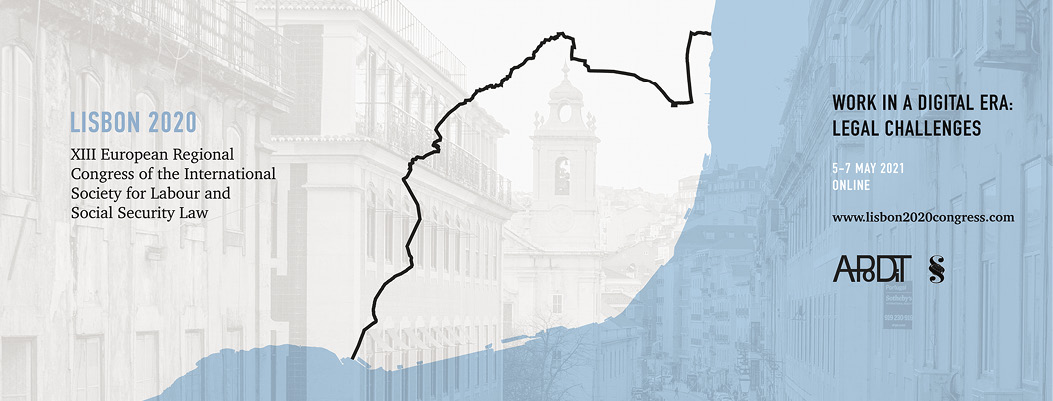Interview with Rosário Palma Ramalho, Full Professor At The Faculty Of Law Of Lisbon And President Of Portuguese Association Of Labour Law (APODIT)
Ana Valado
In an interview with Prémio, the president of APODIT, Rosário Palma Ramalho,, tells us about the major changes taking place in the field of labour given the pandemic and the resulting changes in the way we work.
Lisbon will host for the first time the European Regional Congress of ISLSSL, between the 5th and the 7th of may 2021, under the theme: “Work in the digital era: which rights?”, which will address the most important projections of digital (r)evolution in labour relations.
The Portuguese Association of Labour Law (APODIT) is an effective member of the International Society for Labour and Social Security Law (ISLSSL), representing Portugal in this institution. How does Portugal position itself in terms of labour laws with other member countries? Are there big differences?
Labour laws tend to be very domestic in the sense that each country looks at these matters differently and according to its traditions. ISLSSL is a scientific society worldwide, with associates on five continents, hence the diversity of perspectives is even greater.
Portugal is part of the group of countries in continental Europe whose labour systems tends to be more protective of workers than, for example, the English and American systems. But, within European countries, Portugal is part of the subgroup of the most protective countries in highly relevant matters such as remuneration, dismissal or collective bargaining.
Has the Pandemic accelerated the need to regulate labour relations differently?
Without a doubt, and on several fronts. Right from the start, the widespread use of distance work we have been witnessing poses new problems and which the legal system is unable to address because the paradigm of labour relations in our legislation is still based on working in the company and it’s very difficult to apply some schemes outside the business context.
The Labour Code does provide for teleworking. But the truth is that work from home that became widespread during the pandemic is a much broader reality and the legal regime for teleworking is absolutely insufficient to solve the problems posed by this new reality. In short, our legal system is not prepared to regulate these forms of work outside the company’s facilities.
On the other hand, even concerning the work provided in business facilities, the pandemic has posed very difficult challenges for companies, not only because of the measures they had to take to face the economic crisis (lay-off and collective redundancies) but also due to the new health rules that were imposed on them and which require the adaptation of facilities, working time regimes, safety rules, among many other changes. However, the current legal framework in these matters does not make it easy to engage in these adaptations.
In your opinion, and coincidentally with the reality that we have been experiencing for a year now, have issues such as gender equality, the right to disconnect professionally or the reconciliation between the profession and private and family life increased? Was it necessary to rethink labour issues for those who are working from home and for those who have children or cannot work from home? Could you highlight some particular situations?
Yes. Working from home poses complex legal issues from several points of view. The working and safety and the health conditions of workers who work from home are often not the right ones and, above all, they are more difficult to control by the employer and the General Labour Inspectorate. Hence the risk of a downgrade in this matter it’s real. On the other hand, this type of work potentiates more invasive forms of control that could harm workers’ privacy. Thirdly, as regards distance work, the boundary between working time and non-working time is blurred, making the question of the right to disconnect more acute. Also, participation in the collective life of the company is more difficult for distance workers, who tend to be more isolated, with inherent inconveniences. And, last but not least, reconciling work and family life is obviously very difficult, especially since children now spend more time at home; and these increased demands for reconciliation help increasing the inequalities between men and women, not only because the so-called care time is still there and is, above all, a female time, but also because it is women who systematically have to stop working to care for their children ( 80% of requests for special assistance allowance in situations where children cannot go to school due to the pandemic were made by working mothers), and this promotes discrimination.
It is worth mentioning that these challenges posed by distance work were already there before the pandemic because digital technologies in themselves facilitate the emergence of this type of work and our legal system is not prepared to respond to the problems they raise. The pandemic did make these problems much more evident and their resolution much more urgent.
Has there been a race to draft new laws to focus on the virtual world we are heading to?
The virtual world and the digitisation movement have evolved much more quickly than the law, obviously – legislative processes are slow and rightly so because a hasty law is almost always a bad law, which can create more problems than the ones we are trying to solve.
Nonetheless, in terms of work, standards have been approved, especially aimed at new technologies, in sensitive matters such as remote surveillance, workers’ personal data or the privacy of e-mail messages. But everything else remains to be done since our law is still firmly based on the paradigm of typical subordinate labour relations, developed in business facilities. Hence the need to reflect globally on the repercussions of the digital age on companies and at work, something we will be doing during this Congress.
New technologies are changing the work paradigm. Is society prepared for this change?
No. Digital technologies are a real revolution (some call them the 4th industrial revolution) which translates into huge changes both in terms of employment and work models, as well as in the management of more classic work relationships.
On the one hand, these technologies contribute to the so-called technological unemployment, but this effect can be offset by the appearance of more jobs in the technological area itself – hence, it is still too early to know if the final balance in the global level of employment is positive or negative. But, above all, these technologies contributed to the dissemination of new forms of subordinate, autonomous and parasubordinated work. Phenomena such as teleworking and other forms of remote working or working on digital platforms are products of digital technology.
On the other hand, digital technologies have also significantly changed the classic working relationships, in the formation of the employment contract and during its execution: in the recruitment processes, algorithms are used and the candidate’s LinkedIn and Facebook are analysed; and in the execution of the contract, the performance of the worker is analysed using digital means, the meetings can be online, the companies have digital files of customers, suppliers and workers, the internal communications are made using digital means, etc…
In short, the digital revolution is creating, at high speed, what Huxley would certainly call a brave new world (of labour)!
The current digital revolution poses a huge challenge for Labour Law. Since the paradigm of labour law is still that of traditional labour relations, existing labour regimes will have to be adapted to the new realities and the new problems posed by them have to be solved. But, because work is not a commodity like any other, the system has to keep ensuring a minimum level of protection for workers, safeguarding the dignity of work.
The XIII European Regional Congress of ISLSSL will be held for the first time in Portugal, between the 5th and 7th of May 2021, under the theme: “Work in the Digital Age: Which Rights?” Why was Portugal chosen to hold the next edition of this international Congress?
The Lisbon Congress will be the first international Congress on a global scale to be held in Portugal on labour issues.
It is, of course, a great honour for the APODIT to have been chosen by ISLSSL to organize this Congress (we were chosen unanimously, after the withdrawal of another candidacy). We wanted to bring this Congress here not only because it is an event of great scientific scope, but also given that the general theme, which we proposed, is of enormous practical interest for legal experts in the labour area (magistrates, lawyers and academics), but also for companies and managers, for workers and union and employers’ associations and also for public entities working in this field.
Hosting this Congress in Lisbon thus allows to promote a wide scientific debate and supported by the best experts in the field (there are almost 50 speakers from many nationalities) and on a labour theme of the greatest importance and topicality, meeting one of APODIT’s missions. And, at this point, we are also comforted by the huge support to this Congress, which has been there since the beginning, both from the Government and other public institutions, as well as from companies and many law firms, and even from social partners, proof of the interest that our initiative has raised among the most relevant players in the area.

What sub-themes will be addressed during the three days of this Congress?
The general theme “Work in the Digital Age: Which Rights?” will be covered in different sessions that, taken as a whole, provide a comprehensive and systematic treatment of the most important projections of digital (r)evolution in labour relations: artificial intelligence and human work, work on digital platforms, safety and health in the workplace and social protection in a digital world, social media and work contract, time and workplace in the digital age, equality and non-discrimination in digital work, robotisation, automation and work, algorithm and work contract, human rights and protection of personal data, and collective action and negotiation in the digital age.
The number of people wishing to participate in this Congress is as expected? In proportion, do continents or countries have equal representation?
Yes. We currently have a few hundred registrations, many nationals, but also many foreigners. But it is too early to tell.
Given the current circumstances, will this Congress be held in an online format? Do you think only this Congress is virtual or the rights are also virtual?
Hosting such a major Congress in online mode is, in itself, a challenge and required big adaptations as the initial model was on-site.
But this model also has its advantages, because it increases the number of participants (we have Congressmen from distant parts of the globe, who would perhaps not travel to Lisbon) and all the contents will be directly accessible online and the sessions can even be watched later, as they will stay online for one year after the Congress, with restricted access to Congressmen. On the other hand, the digital platform where the Congress will take place is very dynamic and allows a set of very appealing features, which offset the absence of a face-to-face Congress.
If it weren’t for the pandemic, holding this Congress online would even have been fun, considering the theme of the event. The model is indeed online, but the Congress and the labour issues we are going to deal with are not virtual quite the opposite!




 MARIA DO ROSÁRIO PALMA RAMALHO
MARIA DO ROSÁRIO PALMA RAMALHO

